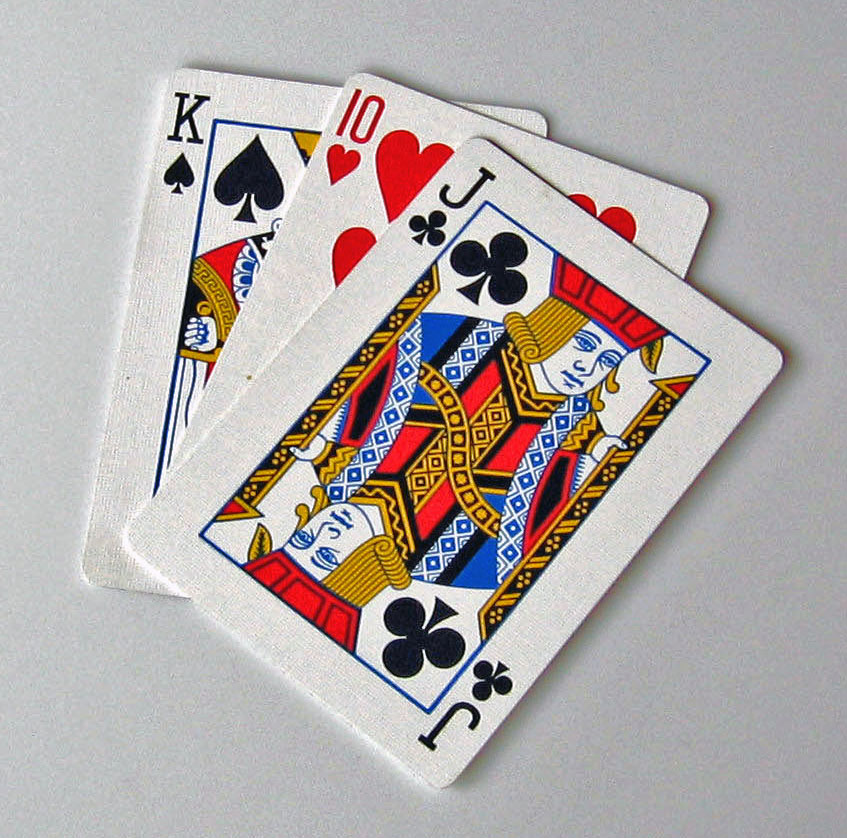|
|
 Etiquette in a public cardroom is fairly simple. Etiquette in a public cardroom is fairly simple.
- A simple faux pas is to not act in accordance with the cardroom's rules. For example, to raise, one typically places all the chips, those to call (if any) and the raise in one motion; you cannot do two hand gestures (this is called a string raise), unless you state your intentions prior to placing chips.
- Cards are to be face-down to other players until showdown. If you fold, you hand in your cards face-down. If you are in the hand until showdown, you turn up your cards if either you are first to show (last person to raise shows first) or if your hand is superior to the hands previously exposed. Do not expose cards prior to showdown; depending on local rules, this may mean a comittment to check all raises or you may forfeit the hand.
- If you are requested to cease an activity by a dealer or any other representative of the cardroom, cease that activity.
- Damaging cards is both fairly difficult (because most places use cellulose-acetate cards which are hard to mark, scratch, and bend, and last approximately five years in daily play) and forbidden.
- Don't blame the dealer for a string of bad hands. Don't ask the dealer to "switch decks". This may annoy the other players and it will slow down gameplay.
- Speak only English in an American cardroom. If they can't understand you, they may assume you are in collusion with someone.
- Turn off your cell phone, or set it to vibrate mode. Do not pick it up during game play. If you pick it up, there's the possibility you are receiving information that may provide a clue to the other players' hands, and are therefore cheating.
- Keep your food and drinks off the table. The table is for playing cards and poker chips, not soda pop and potato chips. You have small stands around the tables to hold beverages and food. Food at the table, though, is not recommended if it leaves a residue on your hands. Sandwiches OK, BBQ ribs and fried chicken, no.
- Cheating is right out. Having said that, do not accuse other players of being cheaters. If you are wrong (most likely), you will make an unnecessary scene and end up tossed from the room. If you're right, the cameras above you will catch the guy in the act for you.
- You cannot buy more chips while a round is in progress.
- Failing to call out, "all-in" when you are is a minor issue.
- All your chips must remain on the table during play. You may not remove chips from the table to your pockets, or vice versa.
- Missing blinds in Texas Hold 'em and Omaha Hold 'em.
- Holding up game play. By the time the bet comes round to you, you should know what your course of action is. Calling for "time" when you have a difficult decision to make is acceptable as long as you don't take excessively long or do this very often.
- Remember, the cards speak for themselves. When the hand is over, don't overstate your hand in an effort to cause an opponent to throw away a better hand. Also, don't throw away your own hand until your opponent shows a better hand; he might not have read this etiquette page, and could be lying about having a straight flush. The dealer is the adjudicator of each round.
- Knocking the table is a check, tossing your cards is a fold. Saying "Check" or knocking the table is the same thing. Placing your chips down without a spoken amount commits you to the full value of the laid chips or the table maximum, whichever applies. Calling a raise means following through.
- The most important thing: NEVER EVER PLAY WITH MONEY YOU CAN'T AFFORD TO LOSE.
|
|